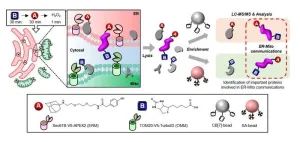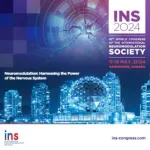(Press-News.org) Melanoma is the deadliest form of skin cancer. With global incidence rates rising, new, more effective treatments are necessary to alleviate the health burden of the disease. Important advances in recent years include doctors using genetic tests to look for specific mutations they can target for more personalised, effective treatment.
Around 1 in 2 melanoma patients will have mutations in the BRAF gene. This gene normally makes a protein which helps control cell growth, but mutations can cause the cells to grow and divide uncontrollably instead, happening in many different types of cancer including melanoma.
The discovery of BRAF mutations has led to development of targeted therapies to inhibit its function. One of the standard treatment options for melanoma over the last ten years has been to simultaneously target both BRAF mutations and MEK. These two genes are part of the MAPK signalling pathway, which, in cancer, is rewired for uncontrolled growth. Targeting two different critical points in the same domino chain helps slow or stop cancer growth.
Despite great initial responses to the combined use of the first-generation inhibitors, around 50% of melanoma patients with BRAF mutations will relapse within one year. The cancer acquires resistance to the drugs, finding other ways to reactive the MAPK pathway through mechanisms which remain poorly understood.
“Melanoma drug resistance is a huge clinical problem because it occurs in almost all BRAF-mutated patients under BRAF/MEK inhibitor therapy and there are few or no therapeutic alternatives. There is an urgent need to understand the many different underlying mechanisms and find new strategies to deal with this constantly evolving arms race,” says Dr. Francisco Aya Moreno, a medically-trained oncologist and recent PhD graduate at the Centre for Genomic Regulation (CRG) in Barcelona.
A study published today in the journal Cell Reports has disentangled the mechanisms behind one of the ways cancer cells develop resistance to targeted therapy. The study found that, in response to treatment, melanomas can ‘break’ parts of their BRAF gene, also known as genomic deletions. This helps the tumour create alternative versions of the protein (altBRAFs) which lack regions targeted by BRAF inhibitors, reactivating the MAPK pathway and making the drugs less effective. The finding was consistent across various lab models and patient tumour samples.
The findings are important because altBRAFs were thought to be made through alternative splicing, which is when cells use the same gene to synthesise different proteins. The discovery that genomic deletions, and not splicing, are the cause means a shift away from previous proposals for using drugs that target splicing as a therapeutic strategy.
"For years, we've known that some patients produce altBRAFs and these help the cancer resist treatment, but we misunderstood the mechanism behind their creation. Knowing that genomic deletions are the cause opens new avenues for developing therapies that could more effectively help patients with BRAF mutations,” explains ICREA Research Professor Juan Valcarcel, co-author of the study and researcher at the Centre for Genomic Regulation.
Surprisingly, the researchers found evidence of the same genomic deletions in melanomas which hadn’t been treated yet. In other words, melanomas can naturally develop mechanisms that mimic drug resistance, even without exposure to drugs. Identifying and targeting these early resistance mechanisms through profound genetic testing in a clinical setting before treatment begins could improve the efficacy of first-line therapies.
Even more surprisingly, further analyses revealed that genomic deletions might be a more widespread mechanism of oncogenesis and resistance than previously thought. Though uncommon, researchers found evidence of altBRAFs in melanomas with a normal-functioning BRAF gene, as well as in other types of cancer including non-small cell lung cancer, breast cancer, kidney cancer and prostate cancer. The findings could increase the patient population benefiting from targeted treatments which are currently under clinical development.
“There is an emerging class of drugs known as second generation RAF inibitors. Unlike BRAF inhibitors, these drugs have a broad spectrum, and so could potentially inhibit the function of altBRAFs. Clinical trials which are assessing their effectiveness should also expand to include melanoma patients with a normal functioning BRAF gene as well, and possibly to other cancer types which express altBRAFs,” explains Dr. Aya Moreno.
Dr. Aya Moreno is part of the second cohort of the PhD4MD programme, a joint effort by Centre for Genomic Regulation (CRG), the Institute for Research in Biomedicine (IRB Barcelona), the August Pi i Sunyer Biomedical Research Institute (IDIBAPS) and the Vall d'Hebron Research Institute (VHIR) designed to leverage the medical insight of a doctor to drive research that benefits patients.
"Having the opportunity to approach this research with both a clinician's perspective and a scientist's curiosity has been invaluable. It allowed us to uncover not just how melanomas resist treatment but also how this knowledge could lead to more effective therapies for patients. This fusion of clinical insight and scientific investigation is crucial for making real progress in our fight against cancer,” concludes Dr. Aya Moreno.
The study was led by Dr. Aya Moreno and co-supervised by Professor Juan Valcarcel at the Centre for Genomic Regulation and Dr. Ana Arance at IDIBAPS. It was also carried out in collaboration with Nuria López Bigas’ research group at IRB Barcelona. Since completing his PhD at the CRG, Dr. Aya Moreno has returned to the Medical Oncology department in the Hospital Clinic in Barcelona.
END
Melanomas resist drugs by ‘breaking’ genes
Genomic deletions explain why some types of melanoma resist targeted therapies
2024-04-12
ELSE PRESS RELEASES FROM THIS DATE:
Africa’s iconic flamingos threatened by rising lake levels, study shows
2024-04-12
It is one of the world’s most spectacular sights – huge flocks or “flamboyances” of flamingos around East Africa’s lakes – as seen in the film Out of Africa or David Attenborough’s A Perfect Planet.
But new research led by King’s College London has revealed how the lesser flamingo is at danger of being flushed out of its historic feeding grounds, with serious consequences for the future of the species.
For the first time satellite earth observation data has been used to study all the key flamingo feeding lakes in Ethiopia, Kenya and Tanzania over two decades and it identified how rising ...
Vaccination timeliness among US children ages 0-19 months
2024-04-12
About The Study: In this study of National Immunization Survey–Child data, improvements in vaccination timeliness were observed from the 2011 to the 2021 survey. However, widening disparities by socioeconomic indicators signal that increased efforts to facilitate timely vaccination among children in lower-income families are needed.
Authors: Sophia R. Newcomer, Ph.D., M.P.H., of the University of Montana, Missoula, is the corresponding author.
To access the embargoed study: Visit our For The Media website at this ...
Changes in permanent contraception procedures among young adults following the Dobbs decision
2024-04-12
About The Study: Researchers observed an abrupt increase in permanent contraception procedures among adults ages 18 to 30 following Dobbs. The increase in procedures for female patients was double that for male patients. These patterns offer insights into the gendered dynamics of permanent contraceptive use and may reflect the disproportionate health, social, and economic consequences of compulsory pregnancy on women and people with the capacity to become pregnant.
Authors: Jacqueline E. Ellison, Ph.D., of the University of Pittsburgh School of Public Health, is the corresponding author.
To access the embargoed study: Visit our For The Media website ...
Semaglutide vs endoscopic sleeve gastroplasty for weight loss
2024-04-12
About The Study: The results of this study suggest that endoscopic sleeve gastroplasty is cost saving compared with semaglutide in the treatment of class II obesity. On price threshold analyses, a 3-fold decrease in the price of semaglutide is needed to achieve nondominance.
Authors: Christopher C. Thompson, M.D., M.Sc., of Brigham and Women’s Hospital in Boston, is the corresponding author.
To access the embargoed study: Visit our For The Media website at this link https://media.jamanetwork.com/
(doi:10.1001/jamanetworkopen.2024.6221)
Editor’s Note: Please ...
First national study of Dobbs ruling’s effect on permanent contraception among young adults
2024-04-12
The first study to evaluate the effect of the Dobbs v. Jackson Women's Health Organization ruling on permanent contraception procedures among young adults nationwide was published today in a JAMA Health Forum research letter.
The study, authored by policy researchers from the University of Pittsburgh School of Public Health and Boston University, underscores how the 2022 U.S. Supreme Court ruling changed preferences for permanent contraception among people ages 18 to 30, who are more likely to have abortions and are also more likely to experience sterilization regret compared to people over 30.
The study is also the first to assess how the Dobbs ruling ...
One of the largest male infertility genetic studies improves molecular diagnostics and personalized management of andrology patients
2024-04-12
Approximately one in seven couples face difficulties conceiving a child naturally. Half of these cases are due to male infertility – either caused by the complete absence or low number of mature sperm. In today’s clinical practice, over half of these cases remain unexplained, hindering optimal counselling, treatment, and prevention of potential comorbidities. Known genetic factors account for ~10% of male infertility; however, it is believed that a large portion of unexplained cases of spermatogenic failure are caused by genetic defects that ...
Decoding the language of cells: Unveiling the proteins behind cellular organelle communication
2024-04-12
In cellular biology, unraveling the complexities of cellular function at the molecular level remains a paramount endeavor. Significant scientific focus has been placed on understanding the interactions at organelle contact sites, especially between mitochondria and the endoplasmic reticulum (ER). These sites are critical hubs for the exchange of essential biomolecules, such as lipids and calcium, which are vital for maintaining cellular homeostasis. Disruptions in this inter-organelle communication are implicated in the onset ...
BepiColombo spies escaping oxygen and carbon in unexplored region of Venus’s magnetosphere
2024-04-12
A fleeting visit of the ESA/JAXA BepiColombo mission to Venus has revealed surprising insights into how gases are stripped away from the upper layers of the planet’s atmosphere.
Detections in a previously unexplored region of Venus’s magnetic environment show that carbon and oxygen are being accelerated to speeds where they can escape the planet’s gravitational pull. The results have been published today in the journal Nature Astronomy.
Lina Hadid, CNRS researcher at the Plasma Physics Laboratory (LPP) and lead author of the study said: “This is the first time ...
International Neuromodulation Society 16th World Congress to be Held in Vancouver in May 2024
2024-04-12
Vancouver, BC – The International Neuromodulation Society (INS) announces its 16th Scientific World Congress in the breathtaking city of Vancouver, Canada, from May 11-16, 2024. This event, "Neuromodulation: Harnessing the Power of the Nervous System," is set to gather over 1,500 experts from over 40 countries –– with researchers presenting more than 460 abstracts –– all dedicated to advancing research, clinical application, and development in the field of neuromodulation.
This multidisciplinary program will draw clinicians, engineers, scientists, post-doctoral fellows, current students, and device manufacturers, and attendees ...
IOF CSA Medal Of Achievement 2024 awarded to Professor Patricia Clark
2024-04-12
The IOF Committee of Scientific Advisors (CSA) Medal of Achievement has been presented to Dr Patricia Clark at the World Congress on Osteoporosis, Osteoarthritis & Musculoskeletal Diseases (WCO-IOF-ESCEO 2024), being held in London, UK from April 11-14, 2024.
The CSA Medal of Achievement honours individuals who have significantly advanced the field of osteoporosis through their original and outstanding scientific contributions, and whose work has helped to increase understanding and awareness of osteoporosis. Candidates are nominated by members ...
LAST 30 PRESS RELEASES:
Chimps’ love for crystals could help us understand our own ancestors’ fascination with these stones
Vaginal estrogen therapy not linked to cancer recurrence in survivors of endometrial cancer
How estrogen helps protect women from high blood pressure
Breaking the efficiency barrier: Researchers propose multi-stage solar system to harness the full spectrum
A new name, a new beginning: Building a green energy future together
From algorithms to atoms: How artificial intelligence is accelerating the discovery of next-generation energy materials
Loneliness linked to fear of embarrassment: teen research
New MOH–NUS Fellowship launched to strengthen everyday ethics in Singapore’s healthcare sector
Sungkyunkwan University researchers develop next-generation transparent electrode without rare metal indium
What's going on inside quantum computers?: New method simplifies process tomography
This ancient plant-eater had a twisted jaw and sideways-facing teeth
Jackdaw chicks listen to adults to learn about predators
Toxic algal bloom has taken a heavy toll on mental health
Beyond silicon: SKKU team presents Indium Selenide roadmap for ultra-low-power AI and quantum computing
Sugar comforts newborn babies during painful procedures
Pollen exposure linked to poorer exam results taken at the end of secondary school
7 hours 18 mins may be optimal sleep length for avoiding type 2 diabetes precursor
Around 6 deaths a year linked to clubbing in the UK
Children’s development set back years by Covid lockdowns, study reveals
Four decades of data give unique insight into the Sun’s inner life
Urban trees can absorb more CO₂ than cars emit during summer
Fund for Science and Technology awards $15 million to Scripps Oceanography
New NIH grant advances Lupus protein research
New farm-scale biochar system could cut agricultural emissions by 75 percent while removing carbon from the atmosphere
From herbal waste to high performance clean water material: Turning traditional medicine residues into powerful biochar
New sulfur-iron biochar shows powerful ability to lock up arsenic and cadmium in contaminated soils
AI-driven chart review accurately identifies potential rare disease trial participants in new study
Paleontologist Stephen Chester and colleagues reveal new clues about early primate evolution
UF research finds a gentler way to treat aggressive gum disease
Strong alcohol policy could reduce cancer in Canada
[Press-News.org] Melanomas resist drugs by ‘breaking’ genesGenomic deletions explain why some types of melanoma resist targeted therapies




